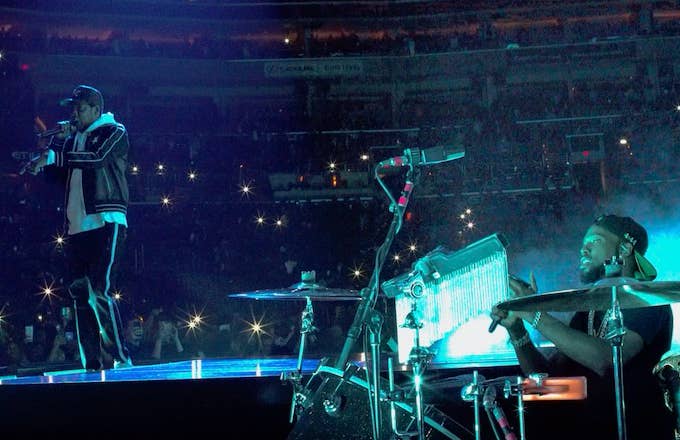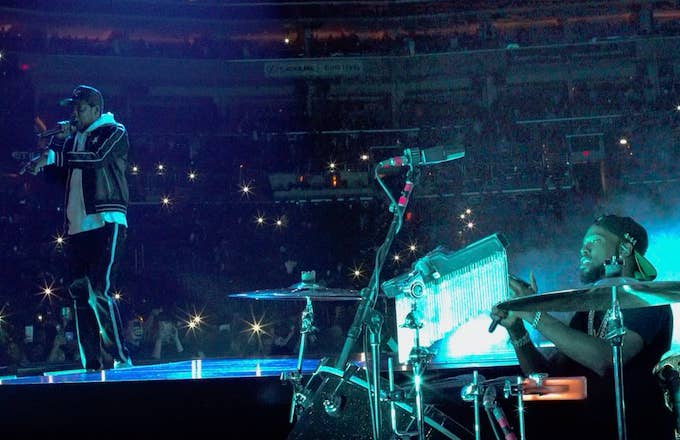
Larrance “Rance” Dopson is the founder of one of the greatest live hip-hop bands on the planet, 1500 or Nothin'. The crew, which includes the Grammy-winning songwriter and producer James Fauntleroy among its members, has toured and recorded with a slew of heavyweight acts, from Rick Ross to Kanye West to Snoop Dogg to Kendrick Lamar and beyond.
Most recently, Dopson and company were the backing band on Jay Z's 4:44 Tour, with Dopson serving as the tour’s music director. And in addition to rocking stadiums across the world, 1500 or Nothin’ is also busy opening up a music academy to pass their skills on to the next generation.
I called Dopson the day after the Grammys (his team won six, if you’re playing along at home) to catch up on awards, tour, and Kendrick.
(This interview has been edited and condensed for clarity.)
Your friend and business partner James [Fauntleory] had a big night with Bruno Mars’ “That’s What I Like."
Man, listen. We just won six Grammys! We’ve been working with Bruno forever and he’s a good friend of mine for like the last twelve, thirteen years. It meant a lot to us because we’ve been through everything together—all the horror stories in the music business, we were in the trenches together. That’s why it means so much. Not only did we get those Grammys, Sam Smith performed a song I produced with Timbaland called “Pray” at the Grammys and that was fucking crazy.
I have to ask about Jay. First off, you were actually touring with him when Grammy nominations were announced. Did you ever hear him talk about that?
Yeah. We were actually on tour when he got the nominations. They were super excited. Jay was really more excited for Rapsody, probably more than him because he has like 21 Grammys already. But he was super excited for his artist Rapsody.
What are your thoughts about Jay getting shut out? Do you think he deserved to win in any of the categories?
Yeah, I mean… I feel like Jay Z should have… I don’t know. This is a tricky question because the Grammys, it’s voted by the music members, so it’s really not up to the people. It’s up to the people that sign up to vote and be a part of the Grammys. So it’s more of a smaller group that's deciding this. But everybody’s album was amazing.
Jay Z’s album should have won something because it was an album that taught you how to be rich and be successful. They were really dropping a lot of gems on people. I don’t think everybody really listened to it. If they really listened to it, he could teach you how to be a millionaire, I think that alone should have gotten a Grammy. But I know for sure Bruno Mars spent two years on that album, probably more than anybody spent on any of those albums—two years straight. So, it’s deserving.
I want to ask about the 4:44 Tour. You guys would pull out a different special song in every city. Who was making those calls? How would you learn the songs?
Well, when we first got the call for the gig, we only had three days to learn 46 songs. That’s why they called us, because we’re good enough to do that shit.
In every city, it was Jay Z’s call. Almost every show we switched it up, due to where we were and what artist was out there [and] what type of vibe we wanted to bring. But I like how Jay Z is so creative. When we were in the Bay, he was like, “Yo, we gotta do some E-40.” So he picked his favorite E-40 song and incorporated that into the show, which was genius because it was keeping the crowd going—which is what it's about in the show.
Jay Z’s album should have won something because it was an album that taught you how to be rich and be successful.
One of the things about 4:44 as an album is that the music and Jay’s delivery feels very intimate. How did you translate that feeling to an arena?
I mean, shout-out to No I.D., my big brother, first of all. He produced the 4:44 album.
It was probably one of the most difficult tours to play due to the fact that a lot of the songs are sample-based and chopped up. A lot of the times, the way No I.D. chops his samples, nothing repeats itself. So being a musician, it’s a lot to learn.That was a cool challenge for us, to be able to play the way No I.D. thinks. It just makes his genius more entire, knowing how he thinks and to know how difficult it was to play all of those songs where nothing ever stays the same. So our memory had to be on point.
You were playing with Young Guru, who was DJing. Would you guys play every song along with pre-recorded tracks?
See, the thing is with Jay Z, all that stuff you was hearing was the real, live band. When you hear the snares and the kicks, we have triggers to where we took the snares and the kicks from the original songs, so our timing has to be impeccable. So we weren’t really using the tracks. If we used anything, it would be the sample of a song or whatever, but all of the core parts as far as the drums and the music, it was the 1500 band.
Wow. I didn’t know that.
Yeah. Most rappers cheat and just play the two tracks and have the band play over it, but that’s the one thing I like about Jay—he doesn’t even use background. He doesn’t even use ad-libs or anything, you know? It’s just his voice.
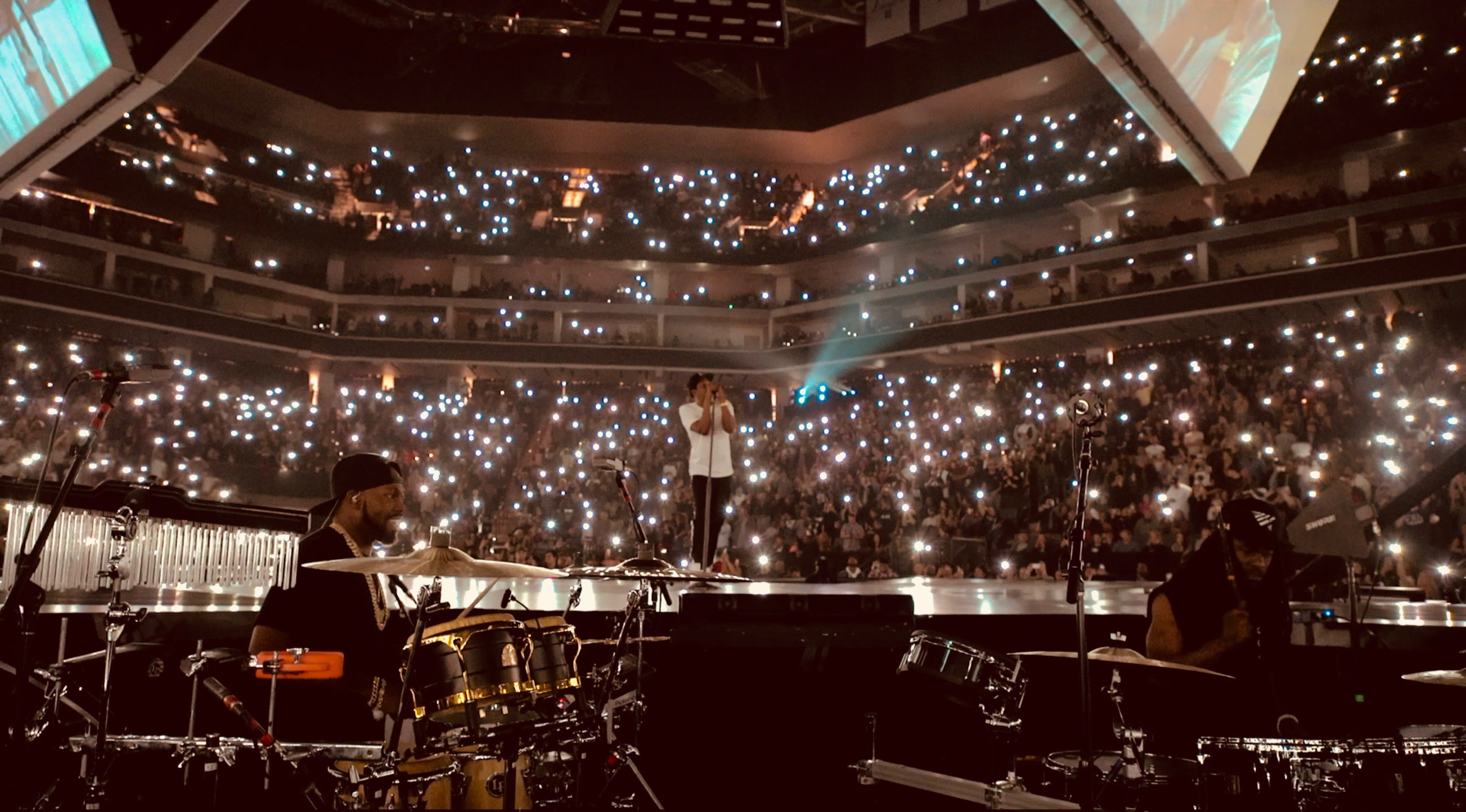
You work with a bunch of rappers, but one who has a thing for using great musicians in his live band is Snoop Dogg. How is he at leading a bunch of live musicians?
Snoop is like my uncle, man. He’s one of the first people I ever worked with in my life. Graduated from high school, [right into] six world tours with Snoop. Snoop helped jump my career off. By me being attached to Snoop, I was able to build relationships with everybody in the business, and that’s how we were able to grow. He’s super cool.
Another thing with Snoop is, for you to be in his band, you gotta really know a lot of songs, You have to have a parent that would listen to Motown and Parliament and funk, all that kind of stuff, because he’ll stop you in the show and tell you to play an Isley Brothers song while he freestyles. So you better know that shit, you know what I mean? Snoop is fun because with him, it’s not as technical as Jay, but it’s got more of a feel. It’s a little bit loose to where we can jam and vibe and catch a chemistry, because Snoop can freestyle and do all of that kind of stuff. So it’s super amazing.
Can you talk about moving into songwriting and production? A lot of your earliest credits are with Snoop and Mack 10 and a bunch of people in that circle. How did that transition happen?
That was maybe 2005. I got my first platinum plaque with Bobby Valentino in 2005. The thing is, we was always either musicians or producers/writers, so either I was on tour or I was in the studio. I started off with Snoop, so he helped a lot. From there, I ended up working with Tyrese and the Underdogs, and that’s where James wrote his first big hit “No Air” with the Underdogs. They helped us out a lot.
The thing about our band is everyone plays instruments, and that’s the secret to music. A lot of producers call themselves producers, which is cool. But it’s a plus to be able to know how to play all these different instruments. That’s what makes our band tight, because we can play every single different instrument and most people want to use us, and we understand the production. We’ve been on stage and in the studio with all these professional artists, so we know what the crowd likes to react to. We know sounds that make people cry. We know what chords make people happy. We just figured out the formulas to this. Being able to work with all these major artists, for them to be able to see how talented we are and rep for us helped a lot. We got a lot of support from the biggest people in the music business. We might not be known to the world but a lot of your favorite artists look up to us and respect our music.
Being able to play multiple instruments—I’ve heard that from other musicians who grew up in the church. Is that where you got that skill?
I mean we all got our skills from church. Church is like, if you mess up, they’re gonna look at you. In church, you can’t cheat. There’s a lot of people that are only playing in one key. But when you play in church, it’s an organ. You can’t transpose, so you have to practice. You’ve got to know how to play in every key. There’s a lot of times in church, a random person will come in and sing a song, and you’ve got to learn how to follow them. So doing all these things under pressure really helped us now. It’s really being a problem solver in shows and being able to work under pressure and to keep the show afloat. That’s really what our job is.
Even before the Bobby Valentino stuff, there was a Keith Murray song you were on in 2003 [Dopson played keyboards on Murray’s 2003 song "Candi Bar."]
Man, listen. Shout-out to Terrace Martin. He just won a Grammy too, for [Kendrick's] “Loyalty.” We got two Grammys together for the Kendrick Lamar album [To Pimp a Butterfly] and “These Walls.” He’s been a longtime friend of mine. He was the person that called me for my first Keith Murray session ever. Now, to be able to have two Grammys with him and still work with him, it’s just unbelievable.
1500 or Nothin’ is now a whole huge business, right? You guys have three bands going out under that name.
We have multiple bands, and that’s one of the things that inspired me to start a music academy, to where we can train people who will be qualified to get these real jobs, and they can be 1500 certified.
I can’t do every gig, but everybody’s still going to call us for every gig because they’re really impressed with us. What we’re doing now is training all the best musicians all around the world to be 1500 certified so we can create opportunities for them. Not only on the band side, but on the music production/writing side. It’s a whole movement.
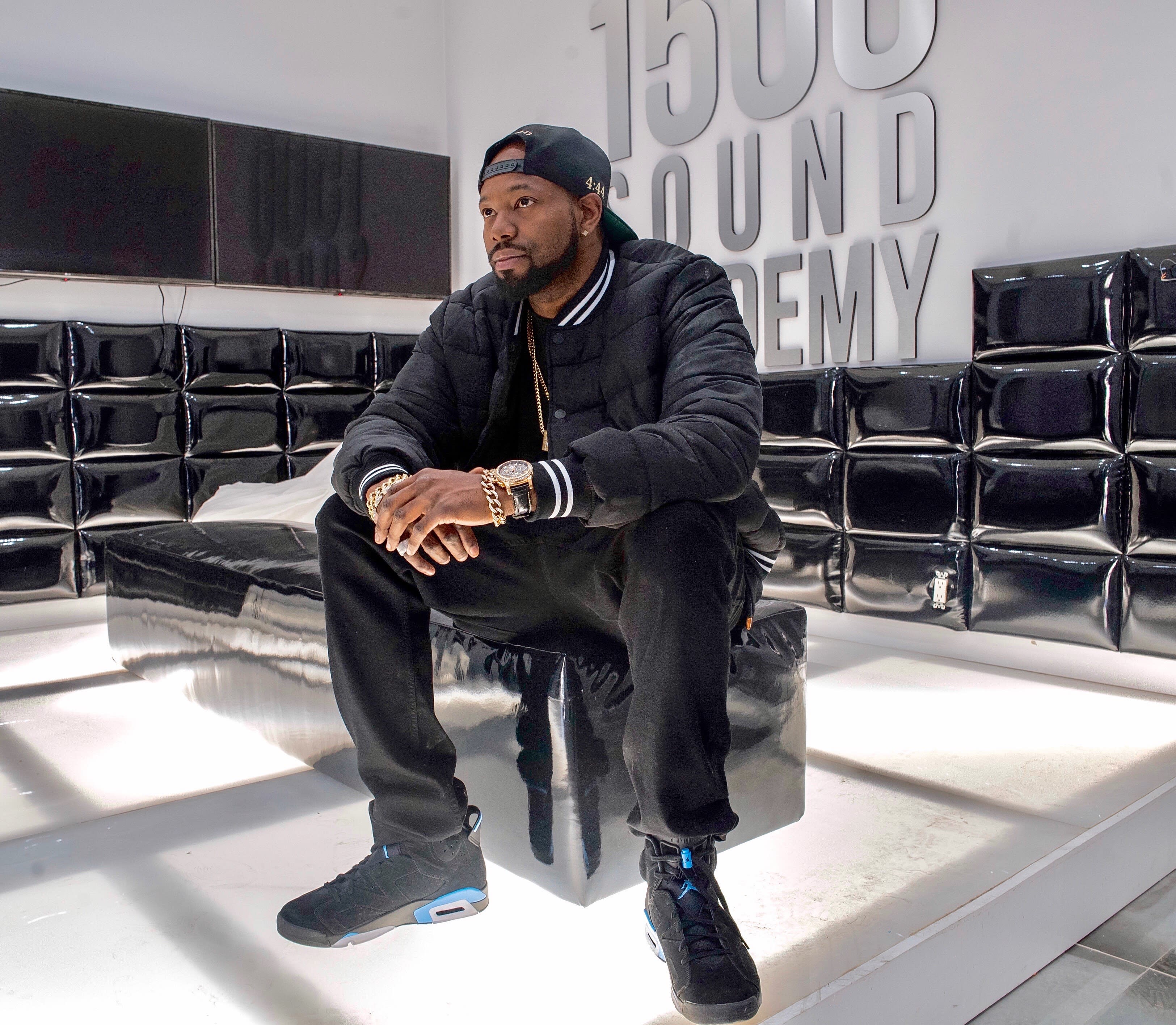
Tell me about the music academy that you’re building.
We have a company called Volume Ventures. Myself and James Fauntleroy are partners with Twila True. We have a venture capital company now. We just bought a 21,000 square foot facility, right across the street from Snoop Dogg’s studio and near the LAX airport, and it’s crazy.
We have three live event spaces, a full music academy, we have a 50-seat movie theater with immersive sound where we can score our films and do music festivals and show the movies that we do. We have seven major studios with the top equipment in the world. We have our clothing store, we have a dance room.
A lot of artists are missing artist development, and that’s what we’re also creating. It’s like the new Soho House for creative people and for minorities that don’t really get a chance to be in these situations. You can come to one place, and it can be the best of the best people getting trained. This is the only place where we work, so if anybody wants to work with 1500, you gotta come to this place—but this place has Jacuzzis and saunas, a meditation room, a think tank room. We have a coding facility, we have an active TV and film facility that we are working with my cousin Larenz Tate on. It’s just so much in this one building. It’s a hub for the best people in the world to create and to share and to network. It’s never been done before.
We’ve got to create the next wave of the sound, and if we don’t do it, it’s going to be trap music for the next 30 years.
As we’re talking, it’s just a couple days before Justin Timberlake’s new record comes out. You were involved in the couple of songs people have heard so far. What can you tell us about Man of the Woods? How involved are you in the album beyond those two tracks?
We were working on the album for months. I was a part of “Filthy” and “Say Something.” Those are the songs he will be performing at the Super Bowl. I am beyond excited about this. “Say Something” is a duet with Chris Stapleton, one of the biggest country artists in the world. It was a great process.
Justin is one of the most talented people I know. He’s hands-on, can play every instrument. Timbaland is a big brother of mine, Timbaland and Danja. We worked on both of those songs together and it was just a vibe, bro. When you’re around the best of the best, it just makes everybody’s job a little bit easier. It’s more fun for us, rather than work.
Are you going to be part of his upcoming live stuff for the Super Bowl or any tours he has planned?
No. To be totally honest, this Jay Z tour was the end of my touring for a while now, because I have the school, all these records out, and touring really slows my life down. We got one of the most expensive jewelry stores in Newport Beach, got a clothing line. There’s so many other ventures that we have that started from us doing great songs in music. I gotta make sure all these companies are up and running before I can just go on tour and leave again. But I did that because it’s Jay Z. He asked, and who’s gonna tell Jay Z no? The 4:44 Tour was an amazing experience that will probably never happen again. We couldn’t turn that one down.
Speaking of Jay, you did that B-Sides gig with him. What was it like getting ready for that? He did some songs there that he had never performed before.
That was probably one of my favorite shows I have ever done in my life, just due to the fact that those were all the songs that we never heard live, and those were the tightest songs to play live. It’s just so many songs where it’s so musical, we really had a chance to really show off and have a ball.
We even had a chance to do “Show Me What You Got.” That was one of the first songs we did as a band with Just Blaze that put us on the map. That was the first time where we can get away with playing church music on a hip-hop [song], so that created a whole new sound. I’ve never heard a song where we were doing drum solos on a beat. So that was something that helped put us on.
That song gave us that confidence that we can break rules. We can be innovative and keep trying to create sounds that haven’t been done before. Even for “Filthy,” that song was done on purpose because we’re in the future. We’ve got to create the next wave of the sound, and if we don’t do it, it’s going to be trap music for the next 30 years. There’s nothing wrong with trap music. I love trap music. But there’s so many other genres and rhythms and patterns from all around the world. Being able to go on tour to Africa and India and see how the cultures are and how they make music, it just inspired us to be innovative.
With “Show Me What You Got,” is there any of the sample [of Johnny Pate's “Shaft in Africa”] left on that record, or is that all you guys?
They kept the horns, but I play the keys and organ and my guy Mars plays bass and guitar, and [Kenneth “Bam” Alexander] plays the drums. We were just going ham over those horns. After Bam put those drums on it, it was a wrap.
You did a couple songs on Travis Scott’s Rodeo album.What was he like to work with? He’s almost as much of a singer as a rapper.
Oh, man. Travis Scott is one of the most talented musical geniuses I know. He does rap music, but he can do all types of genres.
We produced it with my boy Terrace Martin again. A lot of times I just order a bunch of keyboards, just because I love keyboards. I’d just play, and we would just try to catch a vibe. I just started playing chords. I really didn’t want to do anything trap. I wanted to do something different on purpose, because that’s our swag. We gotta try and go against the grain. He loved it. He kept the song and cut half of the song, but I forgot about it. I didn’t know he finished the song and I get a call, it’s on the album. He told me personally that’s one of his favorite songs that he ever did. And that’s a lot of fans’ favorite song too: “Apple Pie.”
You’ve been in the process of capturing footage of your band for a dozen years or so. When can we expect a documentary?
Well, I’m literally meeting today to see the final edit for the documentary. We’ve got a really big announcement coming up soon. I can’t say who our partnership is gonna be with, but the world is finally about to see who 1500 is. They’re about to see our story.
We have footage from 15 years ago when we started: studio footage, tour footage, just hanging out with celebrities—real day-in-the-life stuff. We put this in the documentary to show that if we can make it, anybody can make it. We’re still in the hood right now, helping the hood. It shows our grind, our struggle, everything we went through in the music business, all the bad deals we went through, all the heartaches and pain and it comes out to us winning all the Grammys. So it just proves that if you stick with it and believe in yourself and set your intentions and don’t get distracted, anybody can do anything. You can be a millionaire, billionaire. We’re proof of this, because we are from Inglewood. We’re from the streets. This is something that most people wouldn’t have thought this could even be possible. So now that it is possible, we’re trying to show the world, so all these kids get opportunities to do the same thing.
In the making of To Pimp a Butterfly, you said that they were very cautious about who they let hear in-progress music. So, who’s the biggest A-list celebrity who asked to hear new music during the sessions and got turned down?
Everybody, bro. Everybody got turned down.
People don’t understand that when you’re making an album, it’s spiritual. It’s a vibe. We’re translating music to where we want the whole world to feel. So all it takes is one person coming in there and saying, “Oh man, that sounds like an old Janet Jackson beat” to kill the vibe.
We wanted to keep it super-secret because it was so special to us. We didn’t want anybody to mess that up because we knew what we had. So I like the fact that nobody got to hear it and it was super exclusive, because it translated, right? I got some Grammys out of it and it was amazing.
Everybody really did their best. They put in their best work every day. Even for one of the songs I did called “These Walls" that I produced with Terrace and Fauntleroy, it was a process. It went from me and James writing the chorus to me doing the beat, and then me showing Terrace, and then Terrace putting Robert Glasper on there, and Terrace putting a string arrangement. It was a movie, you know? With overdubs and vocals, Thundercat singing, and Kendrick was going back and doing all the dubs. It was a week-long process. This was serious, and if we were to have people walking in and giving their opinion, that could be super distracting.
I remember talking to Sput [drummer Robert “Sput” Searight] about those sessions and he said it was such a collaborative thing—you could hardly remember who did what by the end of it. Is that how you feel?
Yeah. I mean, I produced “These Walls” but I played percussion almost on every song. I was just coming in there, playing the keys. That brings my point to knowing how to play everything, because the more you know how to play, the more money you make. The more you know, the more opportunities you get—and that’s also what we’re trying to teach these kids. It’s not to learn the computer. It’s more than that.
I couldn’t have produced or wrote the song “Pray” with just a computer, bro. We started that song on the piano, and after the song was done, we added all the other shit and produced it. So it’s really about picking out the right instrument and really getting good.
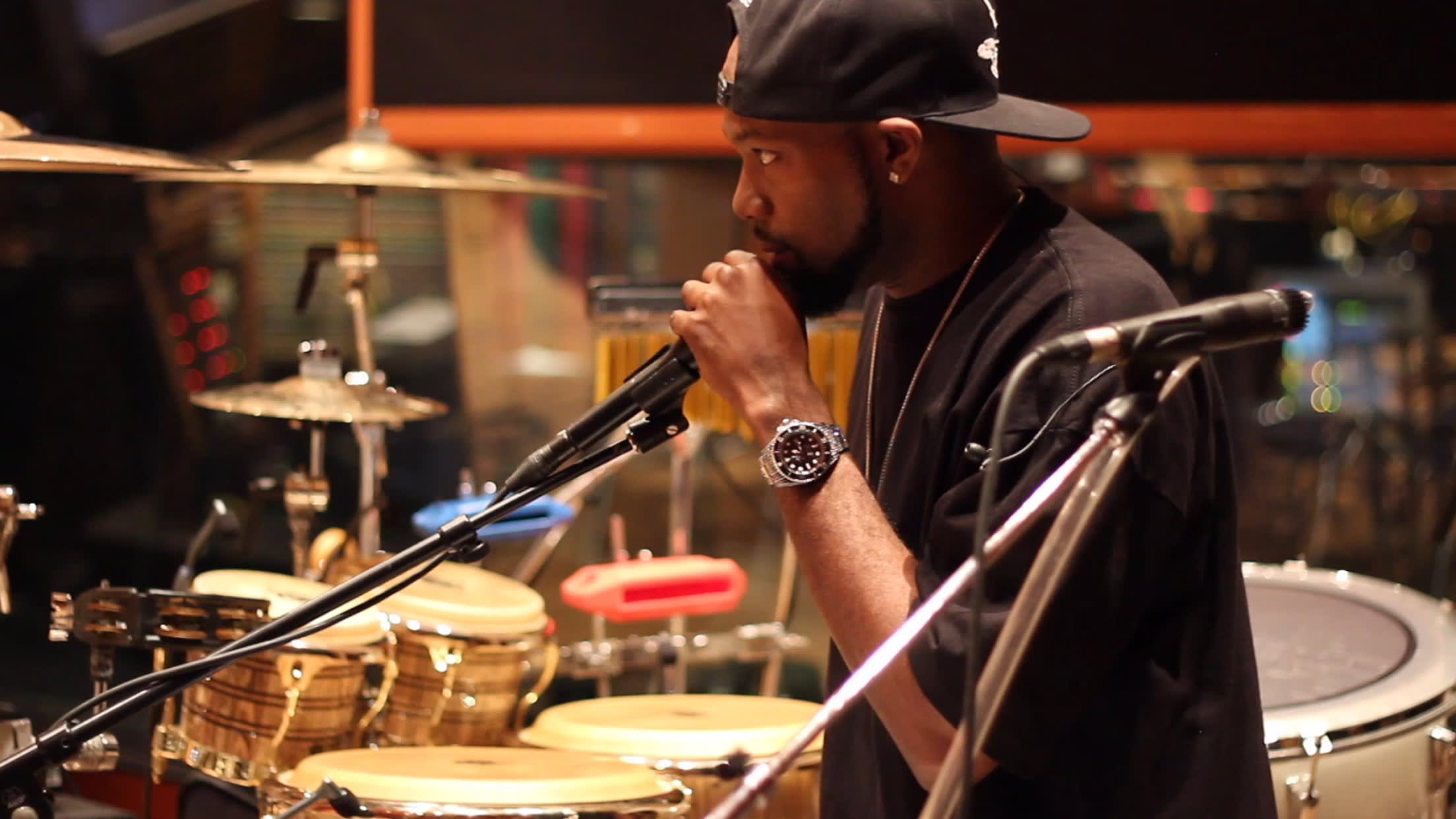
We have a Jay Z obsessive in the office who wanted to know why “Caught Their Eyes” was almost never played on the last tour.
You know what? We’re on the same page because I thought about the same fucking thing, bro. But you’ve got to realize there’s so many hits. Jay Z has hundreds and hundreds of hits. Even for the last L.A. show, after the show was over, he went through like 30 hits with Guru, just playing 30 seconds of each hit. I mean, he’s not perfect. He’s going to miss one or two songs, you know? And he was trying. He has too many hits.
You have a credit on the song that has been my personal get-psyched-up song since it came out, which is Ghostface’s “The Champ.” What do you remember about those sessions?
Oh shit! What you know about that, man? Shout-out to Just Blaze. He called us in, it was so funny. I don’t even know if you realize—you know that’s Blaze talking like he’s the Rocky coach in the beginning. I walked in the session and he was doing that and I’m like, “Wait, are we watching the Rocky movie? What the fuck is going on?” And it was him. I loved it. We just went ham. You want to make real, soulful music—organs, keys—and we killed it. But the most cool thing about that is Just Blaze actually doing that [voice].

